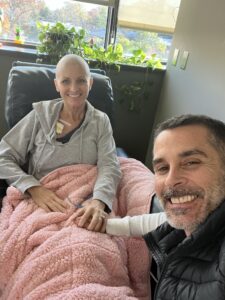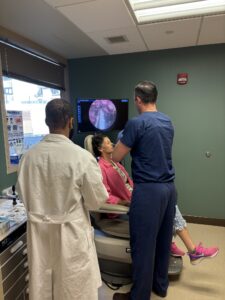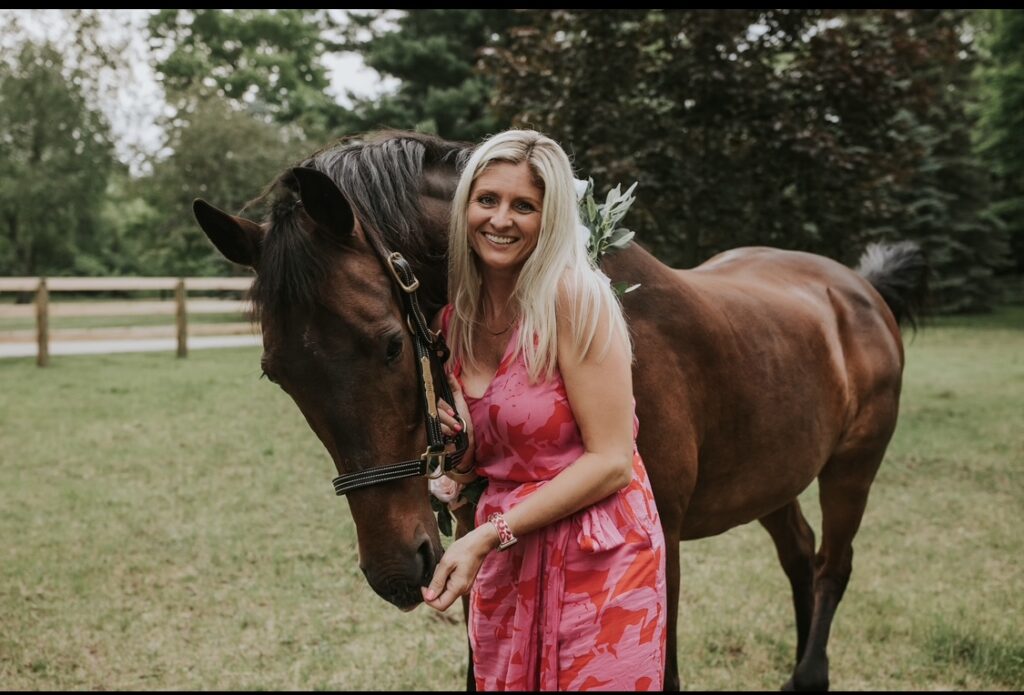Tracy Zappella, now 51, of Lake Orion, MI, was diagnosed in August 2023 with stage 4 basaloid squamous cell sinonasal cancer. When chemo and radiation didn’t get rid of the cancer, her case was presented to the tumor board at the University of Michigan. All six surgeons said surgery was not an option, which prompted a search for another doctor. She ended up receiving lifesaving care from Dr. Garret Choby, MD, and Dr. Georgios Zenonos, MD, in Pittsburgh.

Tracy’s journey started when she had symptoms for a year or two that were similar to allergies. Since she never had allergies, she was surprised by the symptoms. When she started experiencing pain from her nose to her left ear, she knew something was wrong. Treatment was aggressive and difficult. After three rounds of chemo, scans showed the 4 cm tumor was not shrinking much, so 35 rounds of radiation were started immediately in addition to seven more rounds of chemo. Her body was so broken she needed a feeding tube to regain strength.
Three months after chemo and radiation, Tracy was told she needed more chemo as surgery was not an option. Flying to another cancer center to get a second opinion was not a good experience. This is when Tracy remembered a nurse friend telling her upon her diagnosis about the UPMC Center for Cranial Base Surgery in Pittsburgh, “which sees very rare cancers from around the world.”
Tracy called UPMC and told the woman on the other end of the phone that she had stage 4 sinus cancer that was not gone, so she needed a surgeon. “Oh, and I live in Michigan!” she added. The woman said, “I know exactly the doctor you need to see,” and recommended Dr. Choby, who specializes in sinus and skull base surgery, and Dr. Zenonos, Neurosurgical Co-Director, Center for Cranial Base Surgery. Since Tracy’s cancer was touching her brain, it was important to have a neurosurgeon like Dr. Zenonos look at her case. She sent her scans to both doctors and scheduled a Zoom call with them.
Dr. Choby told her they could “absolutely” do the surgery and had in fact just done a similar case the week prior. “My heart was so at ease that I had found the right doctors to help me and get rid of this nasty cancer!” Tracy said.

When asked why he was willing to do the surgery when the doctors in MI were not, Dr. Choby said, “This is a very anatomically challenging area to operate, especially when completing a cancer operation where the tumor needs to be removed, as well as a ‘margin’ of nearby surrounding tissue. We have a tremendously experienced team who is comfortable operating in this area composed of both otolaryngologists and neurosurgeons. When evaluating Tracy’s tumor and the likelihood of a complete surgical resection based on her pre-operative imaging studies, we were optimistic that it would be surgically resectable.”
Surgery was scheduled for August 13, 2024. Tracy booked an Airbnb large enough for several family members and her best friend. She was beyond excited for the pre-op appointments with the doctors. “I felt like these were the ONLY doctors that were giving me my chance to live!” she recalled.
Recurrent cases like Tracy’s are more difficult to treat, especially when they have previously been radiated, Dr. Choby said, because the margins of the cancer are harder to assess in the operating room. There can also be extensive scarring from radiation and increased bleeding.
The most challenging part of Tracy’s case was that her tumor closely abutted the internal carotid artery (the main artery that allows blood flow to the brain), which in this case, was previously radiated. Removing the tumor in this region along the irradiated carotid artery was the most “high stakes” portion of the surgery. In addition, due to the changes from the previous radiation, assessing the surgical margins was indeed challenging. The surgeons were forced to rely quite a bit on “frozen section pathology,” in which they send small pieces of tissue next to the tumor resection margin and rely on the expert head and neck pathologists to guide them if there is any tumor left.
In the 10-hour surgery, Tracy underwent an expanded endonasal transpterygoid approach with partial nasopharyngectomy (through the nose) with an adjunctive transmaxillary approach (through the front of the maxillary sinus). “This is considered to be a minimally invasive approach in the sense that there are no external or facial incisions,” Dr. Choby said. “However, it also allows us excellent maximal exposure to the tumor and surrounding structures.”
The surgery was successful, with the doctors making “sure they got every piece of that cancer!” Tracy said. Compared to chemo and radiation, her recovery from surgery was easy. The next month, Tracy started immunotherapy. That November, she got rid of her feeding tube. She went back and forth to Pittsburgh for six months after the surgery.
Now she does nasal rinses twice a day and sometimes has issues with her left eye because there was cancer behind that eye that was removed. She has side effects from immunotherapy, but it is nothing she cannot deal with. Her hair is getting long, and she lives “a “normal” life other than the side effects. Mentally and physically, she is in a good place.
Tracy will continue to be monitored, with more frequent exams in the first one to two years. Every three months, she gets scans that she sends to Dr. Choby to review and present to the tumor board. He told her whenever she feels she needs a cleanout in her sinuses, she can come to Pittsburgh.
Tracy wants people to know that it is important to be your own advocate. “There was no way I was going to go through chemo again like the University of Michigan doctor told me to do,” she said. “I had a gut feeling that there was another solution, and I searched for it. This was my life! And I had an extremely rare cancer that didn’t have a standard cookbook protocol. I needed more! And I found that with Dr. Choby. He was very confident that he could take my case and come out with a positive result – no cancer! Dr. Choby and Dr. Zenonos literally saved my life.”
